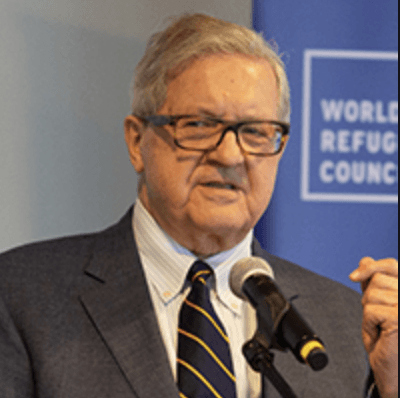HRH Prince El Hassan bin Talal, WRMC Honorary Chair, and the Hon. Lloyd Axworthy, WRMC Chair
30 July 2024
For the last 10 months, the United Nations Relief and Works Agency (UNRWA) for Palestine Refugees in the Near East has faced numerous challenges from the Israeli government and the international community. While Israel has occasionally targeted the agency since 1967, the current trajectory — particularly since the end of January — indicates that the Agency’s operating space in the occupied Palestinian territories is shrinking by the day.
The World Refugee & Migration Council emphasises UNRWA’s essential role in providing healthcare, education, and other vital services to the Palestinian people, especially during times of crisis such as the current war in Gaza. Born out of the United Nations Special Committee on Palestine (UNSCOP),1 UNRWA has been a critical lifeline for millions of Palestinian refugees in the West Bank, Gaza Strip, Lebanon, Syria, and Jordan since 1949. It is crucial to recognize that the Agency’s services serve as a vital lifeline for Palestinian refugees across the region.
Concerted efforts to dismantle UNRWA continue unabated, as Gazan civilians continue to bear the brunt of the violence. As outlined, UNRWA plays an essential role in providing basic human necessities. UNRWA schools are not just places of learning but also provide a semblance of stability in an otherwise turbulent environment. These institutions offer not only education but also a sense of community and continuity — crucial for the psychological well-being of children growing up in conflict zones. The Agency’s services extend beyond basic education and healthcare; they also encompass social services, infrastructure development, and emergency assistance.
In healthcare, UNRWA operates some 140 health centres that deliver essential medical services, including maternal and child healthcare, immunizations, and treatment for chronic diseases. In areas where the healthcare infrastructure is severely limited or non-existent, UNRWA’s medical facilities are often the only available source of care. The agency’s role in preventing disease outbreaks and managing public health crises cannot be overstated.
Moreover, UNRWA’s relief and social services programs support vulnerable populations, including women, children, and persons with disabilities. These programs provide food assistance, cash relief, and vocational training, helping refugees achieve a degree of self-reliance. With economic opportunities scarce, such support is vital for survival and dignity.
Restricting UNRWA’s services threatens to disrupt these critical services, exacerbating the already dire conditions faced by Palestinian refugees. They erode the very foundations of international law and multilateral norms and could lead to a humanitarian crisis, with significant consequences for regional stability.
The international community must push back against calls to dismantle the Agency. UNRWA is targeted because of its role in safeguarding the rights of Palestinian refugees, and because it embodies the international community’s commitment to a just and lasting political solution.
In times like these, initiatives such as restoring the Agency’s funding and protecting its mandate to address the crisis at hand are of vital importance. We must renew our commitment to protecting the integrity and effectiveness of the humanitarian system, of which UNRWA is an essential component. On a similar note, we must also explore avenues for dialogue and conflict resolution to address the underlying issues surrounding the Palestinian refugee question, while safeguarding UNRWA’s mandate and operations as long as a durable solution has not been found and implemented.
It is of vital importance that we support and protect UNRWA’s mandate and mission. Beyond the significance of its lifesaving services, the Agency’s continued existence constitutes a confirmation that the refugees’ unfulfilled rights remain the responsibility of the international community.
———
- Specifically, it was the UN Conciliation Commission for Palestine, or UNCCP, which recommended the creation of a new institution to replace the UN Relief for Palestine Refugees (UNRPR), with an extended mandate for works (i.e., development), that led to UNRWA’s establishment. ↩︎


